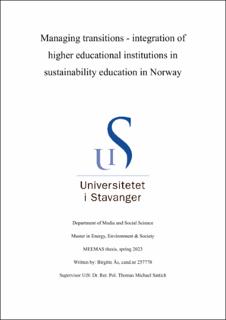| dc.contributor.advisor | Sattich, Thomas Michael | |
| dc.contributor.author | Ås, Birgitte | |
| dc.date.accessioned | 2023-11-28T16:51:13Z | |
| dc.date.available | 2023-11-28T16:51:13Z | |
| dc.date.issued | 2023 | |
| dc.identifier | no.uis:inspera:153029635:91881675 | |
| dc.identifier.uri | https://hdl.handle.net/11250/3105098 | |
| dc.description.abstract | Context.
This thesis audits the development of sustainability competencies in higher educational institutions (HEIs) within sustainability education. It examines how HEIs effectively cultivate competencies aligned with sustainability goals, by analyzing educational policies defining HEIs' boundaries, and exploring students' and alumni experiences as sustainability managers.
The study illuminates the complex relationship between institutional initiatives, curriculum development, and competency attainment. It examines both accomplishments and obstacles, exploring how effectively higher education institutions promote a sustainable future.
Study objective and research questions.
The research objective is to investigate how transition managers should be educated, thus presenting three research questions: (i) Are today's educational policies suited to support the sustainability transition through the development of competencies and skills?; (ii) How are competencies and skills developed in today’s sustainability education?; and (iii) What needs to be improved in order to make higher education a better vehicle for fostering the transition?
Methodology.
Based on case studies from Norway, the research uses a comprehensive approach that combines content document analysis, descriptive statistics surveys, and in-depth interviews. The methods utilized complement each other to gain multiple perspectives and enhance the study's validity.
Key Findings.
Policy documents lack explicit sustainable competency definitions, resulting in vaguely described initiatives for future development. There is a consensus gap regarding a framework describing future competence needs, hindering action as institutions and businesses lack clarity on the next steps.
Students generally agree on the extent to which they were taught sustainable competencies but differ in their understanding of practical application. "Happy" students grasp the 'how' and exhibit 'action competency,' while 'unhappy' students do not. This points to an institutional shortfall due to inadequate integration of sustainability competencies and insufficient real-world learning opportunities.
Implications and contributions.
This research enhances the discourse on sustainability education by comprehensively understanding its impact within the Norwegian context. Bridging the gap between theoretical aspirations and practical outcomes, the study contributes to educational policy, theory integration and practice, promoting a more robust approach to sustainability education.
Conclusion.
The study concludes that for HEIs to become better vehicles for fostering the sustainable transition, several areas must improve:
Accelerating the transition requires involving small-scale actors, such as HEIs, rather than relying solely on a top-down approach. Incorporating HEIs empowers education to create sustainability managers at the ground level, necessitating their increased role in educational policy formation.
Agreement on a detailed framework describing sustainable competencies and skills is essential for effective development, as the current lack of consensus impedes progress.
To fully realize the potential of sustainable competencies, real-life learning opportunities must be incorporated into sustainable education, going beyond theoretical knowledge. | |
| dc.description.abstract | Context.
This thesis audits the development of sustainability competencies in higher educational institutions (HEIs) within sustainability education. It examines how HEIs effectively cultivate competencies aligned with sustainability goals, by analyzing educational policies defining HEIs' boundaries, and exploring students' and alumni experiences as sustainability managers.
The study illuminates the complex relationship between institutional initiatives, curriculum development, and competency attainment. It examines both accomplishments and obstacles, exploring how effectively higher education institutions promote a sustainable future.
Study objective and research questions.
The research objective is to investigate how transition managers should be educated, thus presenting three research questions: (i) Are today's educational policies suited to support the sustainability transition through the development of competencies and skills?; (ii) How are competencies and skills developed in today’s sustainability education?; and (iii) What needs to be improved in order to make higher education a better vehicle for fostering the transition?
Methodology.
Based on case studies from Norway, the research uses a comprehensive approach that combines content document analysis, descriptive statistics surveys, and in-depth interviews. The methods utilized complement each other to gain multiple perspectives and enhance the study's validity.
Key Findings.
Policy documents lack explicit sustainable competency definitions, resulting in vaguely described initiatives for future development. There is a consensus gap regarding a framework describing future competence needs, hindering action as institutions and businesses lack clarity on the next steps.
Students generally agree on the extent to which they were taught sustainable competencies but differ in their understanding of practical application. "Happy" students grasp the 'how' and exhibit 'action competency,' while 'unhappy' students do not. This points to an institutional shortfall due to inadequate integration of sustainability competencies and insufficient real-world learning opportunities.
Implications and contributions.
This research enhances the discourse on sustainability education by comprehensively understanding its impact within the Norwegian context. Bridging the gap between theoretical aspirations and practical outcomes, the study contributes to educational policy, theory integration and practice, promoting a more robust approach to sustainability education.
Conclusion.
The study concludes that for HEIs to become better vehicles for fostering the sustainable transition, several areas must improve:
Accelerating the transition requires involving small-scale actors, such as HEIs, rather than relying solely on a top-down approach. Incorporating HEIs empowers education to create sustainability managers at the ground level, necessitating their increased role in educational policy formation.
Agreement on a detailed framework describing sustainable competencies and skills is essential for effective development, as the current lack of consensus impedes progress.
To fully realize the potential of sustainable competencies, real-life learning opportunities must be incorporated into sustainable education, going beyond theoretical knowledge. | |
| dc.language | eng | |
| dc.publisher | uis | |
| dc.title | Managing transitions - integration of higher educational institutions in sustainability education in Norway | |
| dc.type | Master thesis | |
